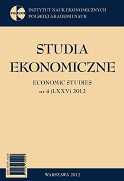Skąd się biorą preferencje ludzi wobec zasad sprawiedliwego podziału?
On People’s Preferences for Principles of Distributive Justice
Author(s): Anna Macko, Marcin Malawski, Tadeusz TyszkaSubject(s): Economy
Published by: Instytut Nauk Ekonomicznych Polskiej Akademii Nauk
Keywords: distributive justice; income distributions; utilitarianism; egalitarianism; Rawls’ principle; risk aversion
Summary/Abstract: There are three well-known general positions on what distributions of income in the society are just. The utilitarian position states that income should be distributed in such a way that the average income in the society, or equivalently the sum of individual incomes, is not less than for any other division. According to the Rawlsian position, the just distribution is one which maximizes the income of the least advantaged individual (the minimal income). The egalitarian standpoint is that the just distribution of incomes minimizes the difference between incomes of the richest and the poorest members of the society (the egalitarian distribution). Our studies allow to formulate the following conclusions: 1. While the motivation of justice is very common and greatly influences human choices, there is no consensus on what is and what is not just in many particular instances. The principle of minimizing the differences of incomes received least support in our experiments. Two other principles – utilitarian and Rawlsian - seem to have similar level of support. 2. Moreover, the notion of distributive justice is far from being unambiguous even at individual level. The ranking of three abstract principles of distributive justice strongly differs from preferences revealed when it comes to real choices of income distributions. The preferences also vary depending on various parameters of distributions. 3. The preferences about principles of distributive justice seem not to depend on the (actual or expected) position of the individual in the society. They seem related to individual attitude towards risk: there is a positive correlation between risk aversion and preference for the Rawlsian principle of maximizing the minimal income when choosing from sets of specified income distributions. It does not appear for verbal declarations of preference about abstract principles of distributive justice
Journal: Studia Ekonomiczne
- Issue Year: 2012
- Issue No: 4
- Page Range: 507-525
- Page Count: 19
- Language: Polish

